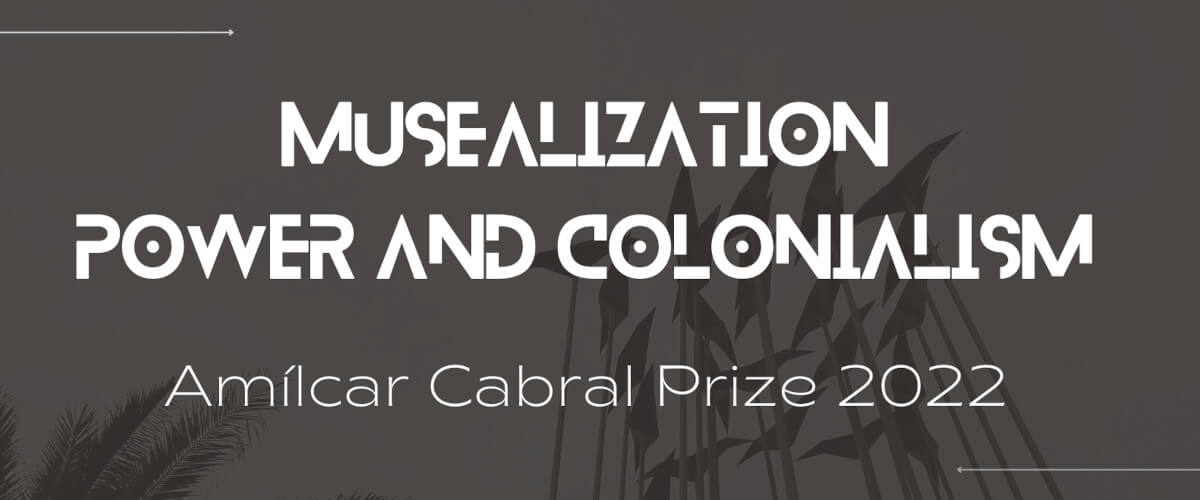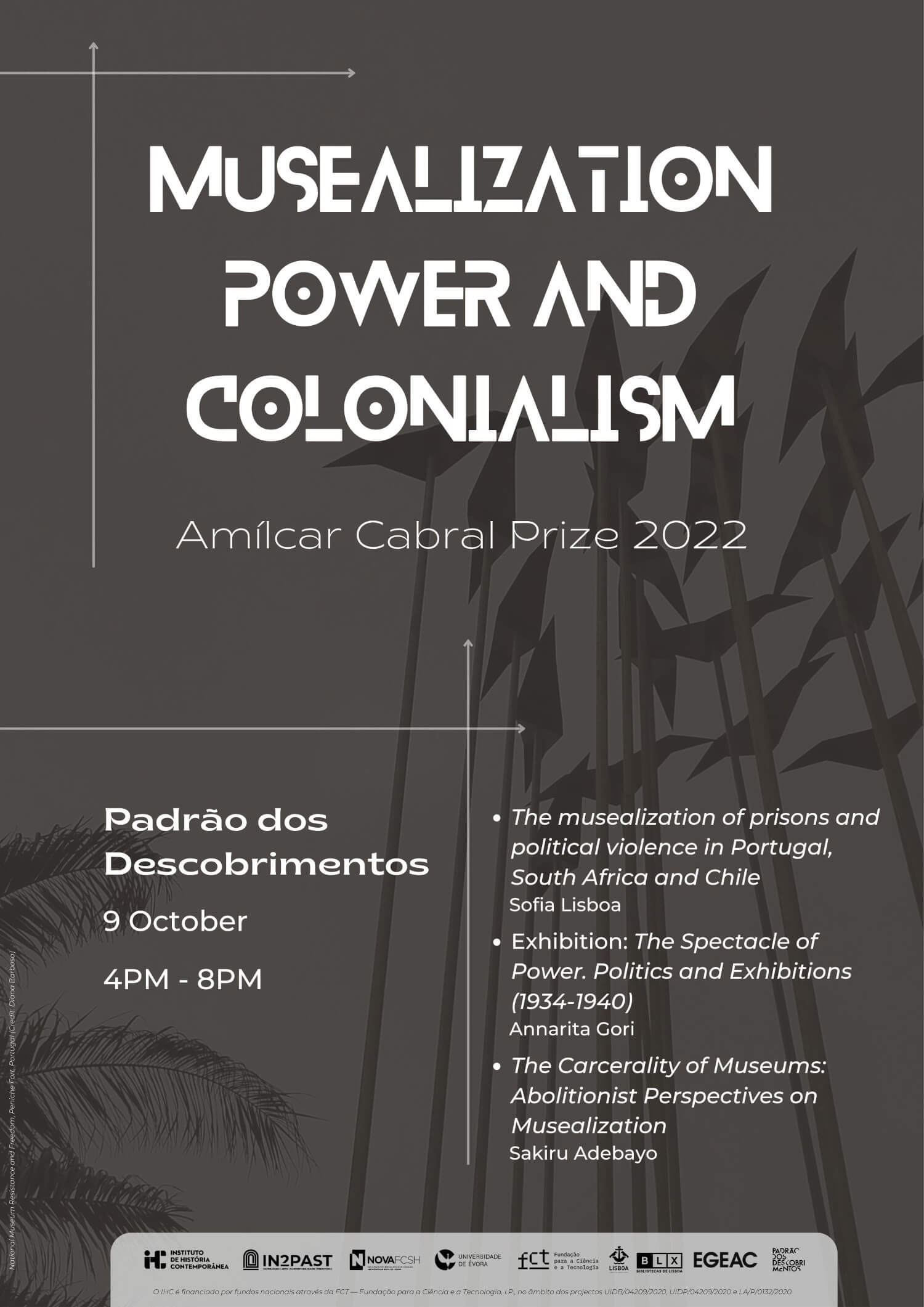outubro, 2023

Detalhes do Evento
Encontro organizado pelo IHC e o Padrão dos Descobrimentos no âmbito da segunda edição do Prémio Amílcar Cabral, atribuído a Sakiru Adebayo, especialista em literatura africana.
Ver mais
Detalhes do Evento
Encontro organizado pelo IHC e o Padrão dos Descobrimentos no âmbito da segunda edição do Prémio Amílcar Cabral, atribuído a Sakiru Adebayo, especialista em literatura africana.
Musealization, Power and Colonialism
No âmbito da Edição 2022 do Prémio Amílcar Cabral, atribuído pelo Padrão dos Descobrimentos e pelo Instituto de História Contemporânea / Laboratório Associado IN2PAST, tem lugar este encontro em que se analisa e discutem duas instituições centrais da nossa modernidade: a prisão e o museu. O prémio Amílcar Cabral foi atribuído, na sua segunda edição, a Sakiru Adebayo.
Programa:
16h00: The musealization of prisons and political violence in Portugal, South Africa and Chile: na ongoing research project
Apresentação de Sofia Lisboa (IHC — NOVA FCSH / IN2PAST), comentário de Victor Barros (IHC — NOVA FCSH / IN2PAST)
A community’s heritage is not a closed, material or “immaterial” inheritance waiting to be preserved, but is made up of testimonies of various kinds that interact with posterity. Therein lies the interest in analysing the projects for the patrimonialisation of memory that are at the origin of the so-called “museums of difficult legacies”, in different historical contexts and latitudes, particularly with regard to the memory of the resistance and struggle for freedom. Looking closely at its museological dimensions, often built on testimonies, we can see their precariousness and conflictuality, but at the same how they are time deeply linked to social and political movements of great importance, which are not over, whose struggles are being updated, and which continue to motivate methodological and conceptual discussions in museums around the world. The National Museum of Resistance and Freedom (Peniche), rescued by the struggles of the present from a fate of obliteration, and to whose identity construction I intend to contribute with my work, is an example of this ongoing battle, as are the other cases with which I compare it, namely the Museo de la Memoria y los Derechos Humanos in Chile and the Robben Island Museum in South Africa.
17h00: The Spectacle of Power. Politics and Exhibitions (1934-1940)
Visita guiada à exposição por Annarita Gori (ICS — ULisboa)
The exhibition focuses on the political exhibitions held in Portugal between 1934 and 1940, and the Portuguese pavilions presented at the international exhibitions in Paris (1937) and New York (1939), exploring the relationship between art, history, power and propaganda. It seeks to create an immersive journey through unpublished documents and photographic records, kept in Portuguese and foreign archives, making it possible to show how, in the 1930s, Portugal invested considerable time, money and human resources in political exhibitions in the country and across borders. The exhibition addresses the background to the event and the event itself, the debates, experiments, mistakes and propaganda trials, both visible and invisible, marking the path that led to the Portuguese World Exhibition in 1940.
18h00: The Carcerality of Museums: Abolitionist Perspectives on Musealization
Conferência de Sakiru Adebayo (University of British Columbia), com comentário de Pedro Cardim (CHAM — NOVA FCSH)
This talk makes three main interventions. Firstly, it argues that the museum is a carceral space and that the looted artifacts within it are essentially in a hostage situation. It highlights the interlocking characteristics of the museum and the prison and shows how both institutions operate on a similar logic. Secondly, this talk employs the concept of the “museum industrial complex” to tease out the extractivist substructures of museum economies and to show how the museum has become –and has always been – a site of capitalist and colonialist accumulation. It explores the elitist origins of modern museums and shows the ways in which this legacy of elitism carries on today. Thirdly, and most importantly, this talk draws from contemporary abolitionist thought in order to address the carceral, colonial, and capitalist underpinnings of the museum. It concludes that the museum as we know it needs to abolish its current paradigms of collection and exhibition. It emphasizes the role of museum activism in the clamour for museum abolition. It shows how museum abolitionism differs slightly from restitutionism by arguing that, in addition to returning (Africa’s) looted artifacts, compensatory plans must be put in place for the violence that accompanied the looting and for the profits made from selling, exhibiting, and circulating the artifacts in Western museums. It suggests that conversations about restitution should also touch on the possibility of creating indigenized alternatives to, rather than received understandings of, the museum.
Tempo
(Segunda-feira) 4:00 pm - 8:00 pm
Organizador
Instituto de História Contemporânea — NOVA FCSH e Universidade de Évora e Padrão dos Descobrimentos / EGEAC

